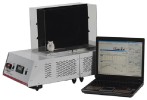Authors
Pereira V, Busserolles J, Christin M, Devilliers M, Poupon L, Legha W, Alloui A, Aissouni Y, Bourinet E, Lesage F, Eschalier A4, Lazdunski M, Noël J
Lab
Clermont Université, Université d'Auvergne, Pharmacologie fondamentale et clinique de la douleur, Clermont-Ferrand, France;
Journal
Pain
Abstract
Two-pore domain background K(+) channels (K2p or KCNK) produce hyperpolarizing currents that control cell membrane polarity and neuronal excitability throughout the nervous system. The TREK2 channel as well as the related TREK1 and TRAAK channels are mechanical-, thermal- and lipid-gated channels that share many regulatory properties. TREK2 is one of the major background channels expressed in rodent nociceptive neurons of the dorsal root ganglia that innervate the skin and deep body tissues, but its role in somatosensory perception and nociception has remained poorly understood. We now report that TREK2 is a regulatory channel that controls the perception of non aversive warm, between 40°C and 46°C, and moderate ambient cool temperatures, between 20°C and 25°C, in mice. TREK2 controls the firing activity of peripheral sensory C-fibers in response to changes in temperature. The role of TREK2 in thermosensation is different from that of TREK1 and TRAAK channels; rather, TREK2, TREK1, and TRAAK channels appear to have complementary roles in thermosensation. TREK2 is also involved in mechanical pain perception and in osmotic pain after sensitization by prostaglandin E2. TREK2 is involved in the cold allodynia that characterizes the neuropathy commonly associated with treatments with the anticancer drug oxaliplatin. These results suggest that positive modulation of the TREK2 channel may have beneficial analgesic effects in these neuropathic conditions.
BIOSEB Instruments Used:
Thermal Place Preference, 2 Temperatures Choice Nociception Test (BIO-T2CT)

 Pain - Thermal Allodynia / Hyperalgesia
Pain - Thermal Allodynia / Hyperalgesia Pain - Spontaneous Pain - Postural Deficit
Pain - Spontaneous Pain - Postural Deficit Pain - Mechanical Allodynia / Hyperalgesia
Pain - Mechanical Allodynia / Hyperalgesia Learning/Memory - Attention - Addiction
Learning/Memory - Attention - Addiction Physiology & Respiratory Research
Physiology & Respiratory Research
 Pain
Pain Central Nervous System (CNS)
Central Nervous System (CNS) Neurodegeneration
Neurodegeneration Sensory system
Sensory system Motor control
Motor control Mood Disorders
Mood Disorders Other disorders
Other disorders Muscular system
Muscular system Joints
Joints Metabolism
Metabolism Cross-disciplinary subjects
Cross-disciplinary subjects Preclinical studies and opioids: role in crisis management in the United States
Preclinical studies and opioids: role in crisis management in the United States 